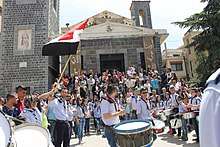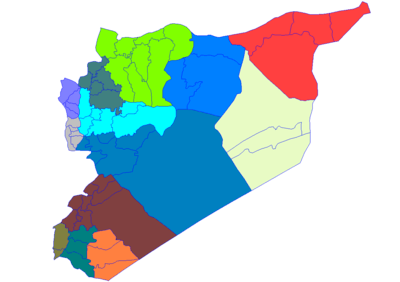As-Suwayda
As-Suwayda (Arabic: السويداء / ALA-LC romanization: as-Suwaydā’), also spelled Sweida or Swaida, is a mainly Druze city located in southwestern Syria, close to the border with Jordan.
As-Suwayda السويداء | |
|---|---|
City | |
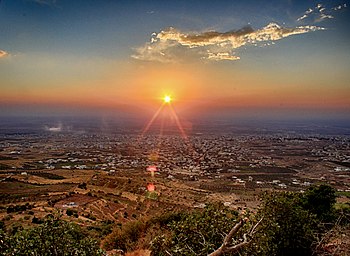 Suwayda's City aerial view October 2011 | |
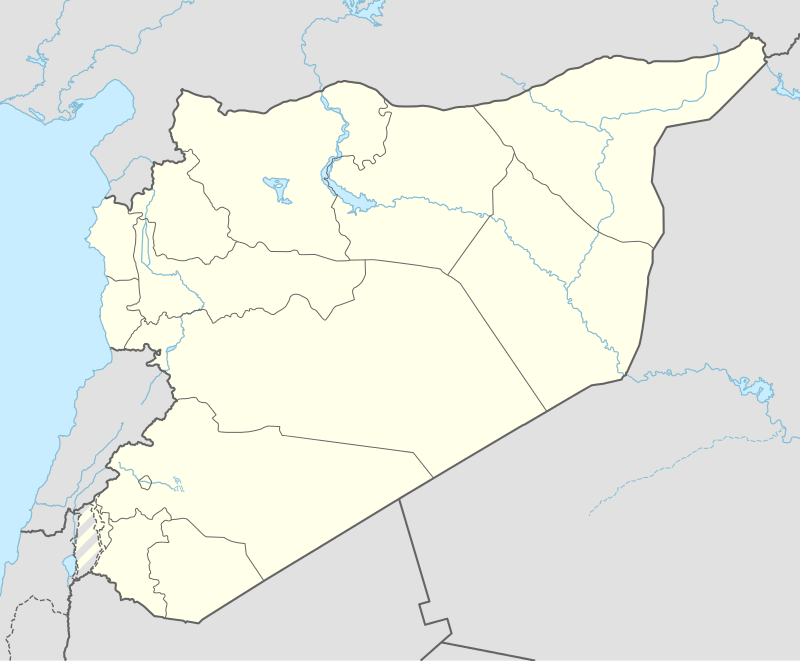 As-Suwayda Location of As-Suwayda within Syria | |
| Coordinates: 32°42′45″N 36°34′00″E | |
| Grid position | 296/235 |
| Country | |
| Governorate | as-Suwayda |
| District | as-Suwayda |
| Subdistrict | as-Suwayda |
| Elevation | 3,543 ft (1,080 m) |
| Population (2004 census[1]) | |
| • City | 73,641 |
| • Metro | 138,822 |
| Time zone | UTC+2 (EET) |
| • Summer (DST) | UTC+3 (EEST) |
| Area code(s) | 16 |
| Geocode | C6147 |
| Climate | Csa |
It is the capital of As-Suwayda Governorate, one of Syria's 14 governorates, bordering Jordan in the South and Daraa Governorate in the West and Rif Dimashq Governorate in the north and east. The city is referred to by some as "Little Venezuela" due to the city's influx of affluent Venezuelan Syrian immigrants.[2][3][4][5]
Demographics and population
The inhabitants of the city are mainly Druze with a prominent Greek Orthodox Christians minority.
The population of As-Suwayda Governorate is 313,231 (2004 census). According to estimates from the Venezuelan Embassy in Damascus, almost 60% of the population of As-Suwayda was born in Venezuelan territory and possesses double nationality.[6][7]
History
Ancient and Medieval eras
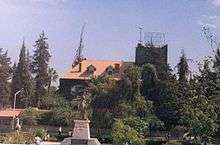
The city was founded by the Nabataeans as Suada. It became known as Dionysias Soada (Ancient Greek: Διονῡσιάς) in the Hellenistic period and the Roman Empire, for the god Dionysus, patron of wine - the city is situated in a famous ancient wine-producing region.
The name Dionysias replaced the former Nabataean name in 149 AD after Nabataean influence decreased and then concentrated towards the south, as a result of the then accelerating Hellenization of Coele-Syria.
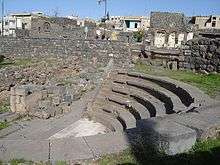
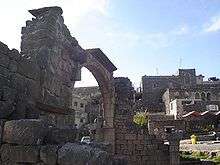
Dionysias was a part of the Roman province of Arabia Petraea, and received the rights of civitas during the reign of Commodus between 180–185.
Dionysus was worshipped in the same Nabatean temple dedicated to Dushara. This practice of associating the worship of local and Hellenic gods was common in Hellenistic Syria.
This name remained in use during the Byzantine Empire, when the town was under the influence of the Ghassanids. Dionysias then was a diocese with a suffragan bishop from Bosra. It was mentioned in the Synecdemus of Hierocles. After the early Muslim conquests it became a titular see.[8]
Yaqut al-Hamawi noted in the 1220s that As Suwaida was "a village of the Hauran Province".[9]
Ottoman era
In 1596 As-Suwayda appeared under the name of Majdal Sawda in the Ottoman tax registers as part of the nahiya (subdistrict) of Bani Nasiyya of the Hauran Sanjak. It had a population of 5 households and 5 bachelors, all Muslim. The villagers paid a fixed tax rate of 20% on various agricultural products, including wheat, barley, summer crops, goats and/or beehives, in addition to "occasional revenues"; a total of 6,125 akçe. 3/4 of the revenue went to a waqf.[10]
In recent times Dionysias was firstly identified as-Suwayda by William Waddington.
Modern era
The city has been held by the government for the duration of the Syrian Civil War and has seen relatively little fighting. On 28 October 2012, security forces launched a campaign of mass arrests in the city.[11]
2018 As-Suwayda attacks
On July 25 2018 the city, which had been by that time far away from the front lines, was rocked by a string of terrorist attacks. A group of at least 56 ISIS-affiliated attackers entered the city and initiated a series of gunfights and suicide bombings on its streets killing at least 246 people, the vast majority of them civilians. Many of the terrorists were reported killed during the attack, bringing the total death toll to at least 302 people. [12] Forty-two Druze ages 7 to 60 were kidnapped by ISIS and are being held captive. One has been executed bringing the total in captivity to 41. [13]
2020 Suweida protests
On 7 June 2020, anti-government protests erupted in the city due to the deteriorating economic situation. Protesters demanded the resignation of President Bashar al-Assad for the first time in the city which had remained loyal to the Syrian Government throughout the civil war.[14][15]
Archaeology
Many archeological sites could be found in the old part of the city:
- Temple of Dionysus-Dushara: eight well-decorated columns are still standing from the temple.
- Saint Sergius Basilica: was built in the fifth century. It has Byzantine architectural elements, with an abbey surrounding it. The basilica was dedicated to Sergius.
- The arch of the lesser church: the church itself is ruined. An arch is still standing there known locally as "The Gallows" (Arabic: المشنقة al-Mashnaqah) with grape motif decorations.
- The theater: was recently discovered, south of the Agora.
The city has many ancient reservoirs, towers and old Roman houses that are still inhabited by locals.
Many parts of the old city are still to be excavated, such as the Roman aqueduct, a conical reservoir, and a larger Roman theatre.
Climate
As Suwayda's climate is classified as warm and temperate. There is more rainfall in the winter than in the summer in As Suwayda. This location is classified as Csa by Köppen and Geiger. The average temperature in As Suwayda is 15.5 °C. About 323 mm of precipitation falls annually.
| Climate data for As-Suwayda | |||||||||||||
|---|---|---|---|---|---|---|---|---|---|---|---|---|---|
| Month | Jan | Feb | Mar | Apr | May | Jun | Jul | Aug | Sep | Oct | Nov | Dec | Year |
| Average high °C (°F) | 10.5 (50.9) |
11.7 (53.1) |
15.2 (59.4) |
20.1 (68.2) |
25.4 (77.7) |
29.2 (84.6) |
30.1 (86.2) |
30.9 (87.6) |
29.2 (84.6) |
26.0 (78.8) |
19.1 (66.4) |
12.8 (55.0) |
21.7 (71.0) |
| Daily mean °C (°F) | 6.2 (43.2) |
7.1 (44.8) |
10.0 (50.0) |
13.9 (57.0) |
18.3 (64.9) |
21.7 (71.1) |
22.8 (73.0) |
23.5 (74.3) |
21.8 (71.2) |
18.9 (66.0) |
13.6 (56.5) |
8.3 (46.9) |
15.5 (59.9) |
| Average low °C (°F) | 1.9 (35.4) |
2.6 (36.7) |
4.8 (40.6) |
7.8 (46.0) |
11.3 (52.3) |
14.2 (57.6) |
15.6 (60.1) |
16.1 (61.0) |
14.4 (57.9) |
11.8 (53.2) |
8.1 (46.6) |
3.9 (39.0) |
9.4 (48.9) |
| Average precipitation mm (inches) | 69 (2.7) |
71 (2.8) |
57 (2.2) |
21 (0.8) |
8 (0.3) |
0 (0) |
0 (0) |
0 (0) |
1 (0.0) |
11 (0.4) |
27 (1.1) |
58 (2.3) |
323 (12.6) |
| Source: Climate-Data.org[16] | |||||||||||||
References
- http://www.cbssyr.org/new%20web%20site/General_census/census_2004/NH/TAB13-1-2004.htm%5B%5D
- http://newsfromsyria.com/2009/09/04/hugo-chavez-in-syria/ Many of them came from Sweida. So when their descendants returned, they brought back the Spanish language and South American culture. Sweida is little Venezuela.
- https://www.economist.com/node/16276817 Dubbed “Little Venezuela”, the southern Syrian town of Sweida offers arepa bread, roads named after Latin American revolutionary leaders and visits from Venezuela's president, Hugo Chávez. It has long been known for its Hispanic influence, thanks to generations of Syrians and Lebanese who left in the 19th and 20th centuries to work in South America and who have periodically returned.
- p. 193: And the Syrian town of Sweida is known as "Little Venezuela"
- http://www.gettyimages.ae/detail/news-photo/an-elderly-syrian-man-waves-venezuelas-flag-during-a-visit-news-photo/90340575#an-elderly-syrian-man-waves-venezuelas-flag-during-a-visit-by-hugo-picture-id90340575 Chavez visited Sweida, homeland of many of Venezuela's million strong Syrian community
- http://distintaslatitudes.net/el-levante-y-america-latina-arabe-con-acento-espanol-una-bitacora-de-latinoamerica-en-siria-libano-jordania-y-palestina Around 60% of the population of Sweida was born in Venezuelan territory (spanish article)
- http://www.26sep.net/news_details.php?lng=english&sid=56858 More than 200,000 people from the Sweida area carry Venezuelan citizenship and most are members of Syria's Druse sect, who immigrated to Venezuela in the past century.
- "Catholic Encyclopedia: Dionysias". Newadvent.org. 1909-05-01. Retrieved 2014-06-20.
- quoted in Le Strange, 1890, p. 540
- Hütteroth and Abdulfattah, 1977, p. 218.
- "At least 30 people killed in clashes, most of them in Damascus". Al Jazeera Blogs. Retrieved 25 October 2014.
- https://www.usnews.com/news/world/articles/2018-07-26/death-toll-in-devastating-is-attacks-in-syria-climbs-to-216
- https://ewn.co.za/2018/08/05/islamic-state-in-syria-executes-hostage-from-sweida-attack-media-monitor
- "Protest in southwest Syria against faltering economy, corruption". Al Jazeera. 7 June 2020. Retrieved 15 July 2020.
- Al-Khalidi, Suleiman (11 June 2020). "Protests hit Druze city in Syria for fourth day". Reuters. Retrieved 15 July 2020.
- "Climate: As Suwayda". Retrieved 2016-02-27.
Bibliography
- Hütteroth, Wolf-Dieter; Abdulfattah, Kamal (1977). Historical Geography of Palestine, Transjordan and Southern Syria in the Late 16th Century. Erlanger Geographische Arbeiten, Sonderband 5. Erlangen, Germany: Vorstand der Fränkischen Geographischen Gesellschaft. ISBN 3-920405-41-2.
- Le Strange, G. (1890). Palestine Under the Moslems: A Description of Syria and the Holy Land from A.D. 650 to 1500. Committee of the Palestine Exploration Fund.
